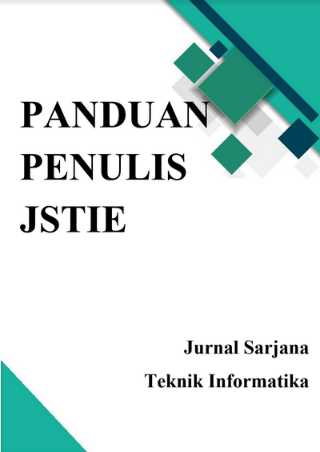IMPLEMENTASI (CRM) COSTUMER RELATIONSHIP MANAGEMENT UNTUK LAYANAN TAMU DI KECAMATAN BERBAH SLEMAN YOGYAKARTA
DOI:
https://doi.org/10.12928/jstie.v3i1.2936Abstract
 Penerapan customer relationship management (CRM) pada Layanan tamu di Kecamatan Berbah dapat diketahui dari upaya yang dilakukan Pemerintah Kecamatan Berbah adalah Layanan digital. Keamanan merupakan hal yang terpenting dari kehidupan sebuah masyarakat, berbagai tindak kejahatan masih ada di dalam sebuah masyarakat  menjadi kendala yang tidak mudah di atasi. Keterbatasan informasi dijadikan sebagai sumber informasi guna mencegah dini resiko kejahatan yang ada dimasyarakat. Dalam pembuatan sistem ini dilakukan dengan SMS gateway, SMS Gateway adalah sebuah perangkat atau sistem yang mampu menangani operasi dasar SMS (mengirim, menerima, membaca dan menghapus SMS) yang berada di luar jaringan GSM standar. Dalam SMS Gateway juga dapat ditambahkan fitur pelengkap seperti autoreply, SMS broadcast.
Metode Pengembangan yang dilakukan pada aplikasi CRM untuk layanan Tamu di Kecamatan Berbah dengan metode waterfall, hal yang mendasari dengan metode ini karena dilakukan secara tersrtuktur dan bertahap. Tahap pengembangan aplikasi terdiri dari pengumpulan data, analisis sistem, perancangan interface, pembuatan diagram aliran data, pembuatan E.R diagram, pembuatan implementasi dengan menggunakan Borland Delphi 7 dan pengujian dengan black box dan alpha test.
Berdasarkan hasil pengujian aplikasi CRM layanan tamu di Kecamatan Berbah berbasis SMS Gateway dengan kemampuan dapat memberikan informasi untuk mengetahui dan memonitoring keadaaan tamu melalui kepala RT setempat di seluruh wilayah Kecamatan Berbah menunjukkan sangat setuju 71,4 % dan setuju 28,6 %. Sehingga dapat disimpulkan aplikasi ini layak dan dapat digunakan dengan baik.
Kata Kunci: Costumer Relationship Management (CRM) layanan tamu, Kecamatan, Â SMS Gateway.References
Nur Saputra Hadi. 2010. “Implementasi SMS gateway Dalam informasi harga pemesanan Handphone dengan pemrograman Delphi 6.0â€. Yogyakarta: Skripsi Informatika UAD.
Rina Sapariyani.2010. “Pengembangan sistem informasi Akademis Via SMSâ€. Yogyakarta: Skripsi Informatika UAD.
Malia Kandou. 2010. “Aplikasi Pendaftaran Pasien Berobat Via Smsâ€. Yogyakarta: Skripsi Informatika UAD.
James G. Barnes.2003. Secrets Customer relationship Management. Yogyakarta: penerbit Andi.
Handayani, sabtaji. 2012. “Membuat SMS Gateway dengan Delphi 7â€. Semarang: Widya Media.
Kristianto.2004. Rekayasa Perangkat Lunak, Yogyakarta : Penerbit Gava Media.
Kristianto.2004. Rekayasa Perangkat Lunak, Yogyakarta : Penerbit Gava Media.
Handayani, sabtaji. 2012. “Membuat SMS Gateway dengan Delphi 7â€. Semarang: Widya Media
Downloads
Published
Issue
Section
License
License and Copyright Agreement
In submitting the manuscript to the journal, the authors certify that:
- They are authorized by their co-authors to enter into these arrangements.
- The work described has not been formally published before, except in the form of an abstract or as part of a published lecture, review, thesis, or overlay journal. Please also carefully read Journal Posting Your Article Policy.
- The work is not under consideration for publication elsewhere.
- The work has been approved by all the author(s) and by the responsible authorities – tacitly or explicitly – of the institutes where the work has been carried out.
- They secure the right to reproduce any material that has already been published or copyrighted elsewhere.
- They agree to the following license and copyright agreement.
Copyright
Authors who publish with Jurnal Sarjana Teknik Informatika agree to the following terms:
- Authors retain copyright and grant the journal right of first publication with the work simultaneously licensed under a Creative Commons Attribution License (CC BY-SA 4.0) that allows others to share the work with an acknowledgement of the work's authorship and initial publication in this journal.
- Authors are able to enter into separate, additional contractual arrangements for the non-exclusive distribution of the journal's published version of the work (e.g., post it to an institutional repository or publish it in a book), with an acknowledgement of its initial publication in this journal.
- Authors are permitted and encouraged to post their work online (e.g., in institutional repositories or on their website) prior to and during the submission process, as it can lead to productive exchanges, as well as earlier and greater citation of published work.







